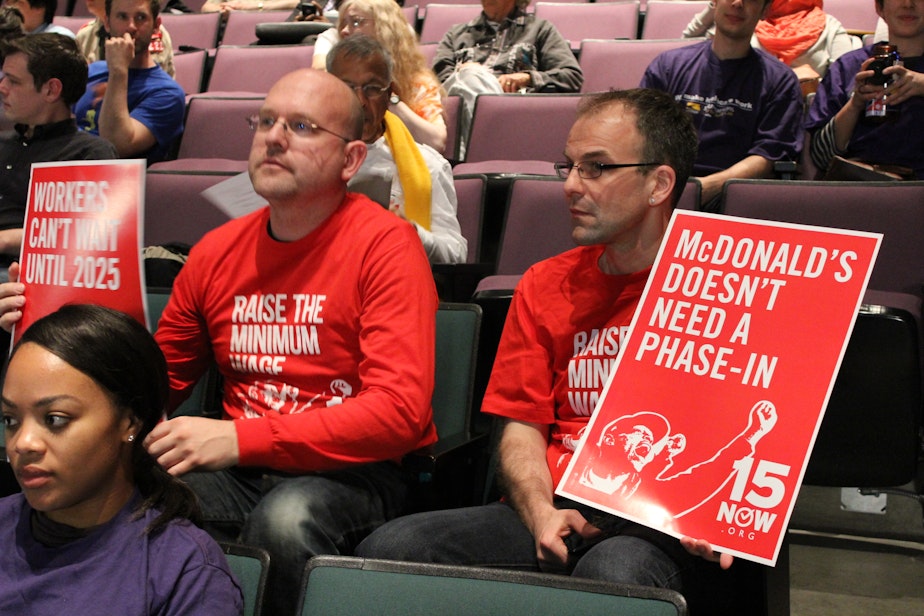15 Now Could Not Have Floated A Charter Amendment This Year

Last week, Seattle became the first city in the nation to establish a $15 minimum wage for all workers. The framework was established by a panel of business, labor and community leaders, which the City Council passed in record time.
Why did it pass so fast?
Looming over the process was a group called 15 Now. They were pushing a much more aggressive $15-an-hour plan, one that some businesses said would be devastating to them.
The group threatened to take the issue to voters in November. They wanted to enshrine the $15 hourly wage in the city charter.
There was a wrinkle in their plan, however: There was no way the group could legally put a charter amendment before voters in November.
KUOW reporter Deborah Wang explained the back story to Marcie Sillman on The Record:
When Ed Murray was elected mayor in November, the first thing he did was to put together a committee made up of labor, business and community groups. The mayor wanted the sides to compromise.
Meantime, the 15 Now group mobilized. Their idea was that if the political process failed, they would put the issue to voters. They were quite sure voters would support a $15 minimum wage.
The group had a choice: initiative petition or charter amendment. The more common process is an initiative.
The city’s charter is like a constitution; to change a charter, more signatures are required to qualify for the ballot. It’s a tougher process, but once a charter amendment passes, it’s harder for it to be changed or rolled back. It’s more permanent.
But charter amendments sponsored by citizens must, according to city law, be floated in odd years – the years when we vote for our mayors and City Council members. City Council-sponsored charter amendments can go on any general election ballot.
The mayor was elected in 2013, and some City Council members in 2011. But there was no way the charter could be amended through a voter-sponsored process in 2014.
In January, the city clerk’s office put out a guide for filing charter amendments, and it contained incorrect information. It suggested that citizen-sponsored charter amendments could go forward in 2014.
City Clerk Monica Simmons called it an oversight. She said the city had copied the deadline for the initiative process without knowing that it was different from the charter amendment process. Her office is working to fix it.
This isn’t an obscure law buried in the records books. The process for amending the charter was amended in 2002 and 2006. And last year, voters approved a citizen-sponsored charter amendment that changed Seattle’s citywide system of electing city council members.
This came to light when Forward Seattle, a pro-business group asked the city to clarify the law, and City Attorney Pete Holmes weighed in. He explained that the bid to change the charter in 2014 wasn’t possible.
Some business owners are now complaining that the $15 an hour wage was rushed through for no reason.
For now, the minimum wage law is scheduled to go into effect April 1, 2015.
Organizers for 15 Now say they are happy with the new minimum wage law and are likely to suspend their signature gathering efforts.
But Forward Seattle has said it plans to aims to put a charter amendment on the 2014 ballot.

